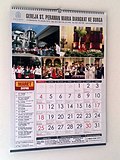Calendar
Lua error in package.lua at line 80: module 'Module:Ancient Olympiads' not found. A calendar is a tool for organizing days. People use calendars to say when something happened, and for planning things that have not happened yet. The calendar gives the days names and numbers, called calendar dates. The dates are usually made based on how things in the sky seem to move. The year and month are based on motions of the Sun and moon. By knowing what day something happened or will happen, people have an easier life. Since the beginning of history, knowing when the seasons would start for crops was very important for farmers.
Calendar systems have a beginning time or era. The calendar era is often a religion-based event, such as the birth of Jesus, but it may be a political event such as a coronation or the founding of a state. Dates that are counted from the coronation are called "regnal".
The three principal calendars most used today are the Gregorian, Hebrew, and Islamic calendars. Other calendar systems from many different parts of the world are also used.
Basis
Calendars are based on three natural things:
- The Earth turns all the way around its axis.
- The Moon goes all the way around the Earth.
- The Earth goes all the way around the Sun.
The Earth turns all the way around its axis about 24 hours. It is called the Solar Day. Days of most calendars are strongly based on the Solar Day.
The Moon turns all the way around the Earth about 29 days, 12 hours, 44 minutes and 2 seconds. Months of some calendars are still strongly based on the Moon. These are called Lunar calendars, which lasts about 354-355 days. Solar calendars ignore the moon, and depend entirely on the Sun.
The Earth goes all the way around the Sun in about 365 days, 5 hours, 48 minutes and 46 seconds. This is called the Solar year. Years of most calendars are strongly based on the Solar year.
Calendar Media
Modern day Indonesian Gregorian calendar for a Catholic church
British calendar, 1851, gilt bronze and malachite, height: 20.3 cm, Metropolitan Museum of Art (New York City)
Equinox seen from the astronomic calendar of Pizzo Vento at Fondachelli Fantina, Sicily
Catalan early 20th century perpetual calendar
Calendar of the Qahal, 5591 (1831)
The Payment of the Tithes (The tax-collector), also known as Village Lawyer, by Pieter Brueghel the Younger
Related pages
- Anno Domini (AD)
- Christian calendar
- Common Era (CE)
- Friday (Muslim)
- Saturday (Jewish)
- Sunday (Christian)
- Gregorian calendar (Christian)
- Hebrew calendar (Jewish)
- Islamic calendar (Muslim)
Other websites
- Calendar for many years, for many countries
- Calendar -Citizendium




